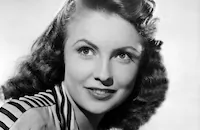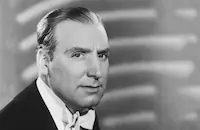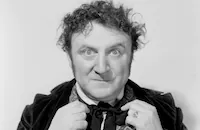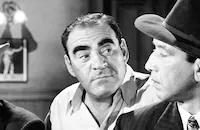Where Do We Go from Here?
Brief Synopsis
Cast & Crew
Gregory Ratoff
Fred Macmurray
Joan Leslie
June Haver
Gene Sheldon
Anthony Quinn
Film Details
Technical Specs

Synopsis
Bill Morgan despairs when he tries to enlist in the Navy and is rejected as a 4-F, as he was by the Army. He goes to the New York U.S.O. canteen where Lucilla Powell, with whom he is in love, works, but Lucilla only has eyes for men in uniform. Lucilla tricks Bill into washing dishes, and he is aided by Sally, a sensible young woman who cannot compete with Lucilla's glamour. Bill is unaware of Sally's feelings for him, just as he is unaware of Lucilla's true, shallow nature. After finishing the dishes, Bill tries to talk Lucilla into a date, but she snubs him for a serviceman. Dejected, Bill returns to his scrap metal yard, which he sees as his only way to contribute to the war effort. There, an elderly woman brings in a load of junk, including an antique lamp. After the woman leaves, Bill is astonished to hear a man's voice begging to be released from the lamp. When Bill drops the lamp, a genie named Ali materializes from its remains and thanks Bill for freeing him. Bill is stunned but quickly recovers when Ali promises him some wishes for his good deed. Bill states that all he wants is to be in the Army, but when he emerges from Ali's magic cloud of smoke, he finds himself at Valley Forge in 1776. The troops with which Bill marches stop at a U.S.O. canteen for coffee, doughnuts and dancing, and Bill is entranced by a hostess named Prudence Smith, who bears an uncanny resemblance to Sally. Bill is distracted from Prudence, however, by the appearance of General George Washington and Benedict Arnold. When he finally speaks to Washington alone, Bill recalls his history lessons from Miss Hockheimer of Bronx High School and assures the general that Arnold is a traitor. Bill also volunteers to spy among the Hessian troops and goes to a tavern, where he meets a flirtatious waitress named Gretchen, who reminds him of Lucilla. Bill almost gets away with his spying mission, but is caught by General Rahl, who sentences him to be shot. Just as he is about to be killed, Bill is whisked away by Ali, whose good intentions continue to be thwarted by his magic timepiece, which is still broken. Although Ali succeeds in getting Bill into the Navy, he winds up on the Santa Maria with Christopher Columbus in 1492. Bill arrives just as disgruntled sailor Benito leads his fellow seaman in a mutiny against Columbus, but Bill is able to persuade them to stop. They soon discover land and Bill sets off in a sailboat for New York. He lands at Manhattan Island, where he is entranced by the sight of a curvaceous Indian woman undressing inside her tepee. Bill's happy exclamation at her show causes the woman to faint, and when Bill checks on her, he is forced to shoo away an encroaching bear. Bill is next terrified by the appearance of the woman's husband, Chief Badger, who threatens to scalp him. Bill talks the chief into selling him Manhattan for twenty-four dollars, but at the conclusion of their deal, finds that he has been swindled by the chief, his wife and their pet bear, who have perpetuated "the old badger game" on him. Bill finally realizes that the "Lucilla type" is not for him, and wishes that he could see the faces of the old Dutchmen when they discover that he owns Manhattan. Ali then transports him to Nieuw Amsterdam of the early 1600s. A respected blacksmith, Bill is enjoying the time period when he is confronted by obnoxious businessman Kreiger, who asserts that he is marrying the girl Bill loves. The woman turns out to be another Sally double named Katrina, and Bill realizes that she is indeed the woman for him. She is being forced to marry Kreiger, however, because he holds the deed to her father's farm. Determined to save Katrina, Bill approaches the city council and proves that he owns Manhattan with the deed signed by Chief Badger. He sells the island to them, but after they levy a series of taxes on him, Bill ends up owing them money and is thrown in jail. He is joined by the inebriated Ali, who helps him rescue Katrina from her wedding to Kreiger, then takes them on a ride through the centuries. When they arrive in the twentieth century, Ali kicks Bill out of the car into a recruiting station, and Katrina becomes Sally. Bill is accepted into the Marines and marches with them in a parade, although Ali at first has him marching with the Women's Marine Reserves. Safely installed among the men, Bill assures Sally of his love, while Ali is accosted by two policemen, who are suspicious of the 854 B.C. birthdate on his draft card. Ali wishes himself into the Marines, and is joined by Lucilla as he marches alongside Bill, who is accompanied by Sally.

Director

Gregory Ratoff
Cast

Fred Macmurray

Joan Leslie

June Haver
Gene Sheldon

Anthony Quinn
Carlos Ramirez

Alan Mowbray

Fortunio Bonanova

Herman Bing

Howard Freeman

Otto Preminger
John Davidson
Rosina Galli
Fred Essler
Bert Roach
Paul Weigel
Ferdinand Munier
Harry Holman
Harrison Greene
Joseph Haworth
Scott Elliott
Robert B. Castaine
William Carter
Arno Frey
Max Wagner
Larry Thompson
Bob Stephenson
Will Kaufman
Walter Bonn
Hans Von Morhart
Joe Bernard

Hope Landin
Dick Elliott
Norman Field
Edward Clark
Cyril Ring
Sam Bernard

Ralph Dunn
Ralph Sanford
Edward Hyans
Helen Servis
Eileen Scott
Robert Hamilton
Buddy Moore
Ed Stanbridge
Richard Reed
Hal Taggart
Ronald Stanton
Jack Ross
Louis Mosconi
John Roche
Warren Lane
Allan Ross
Jack Lomas
Dinsmore Delano
Bill Voorhees
William Lundy
Joseph De Angelo
Randolph Hughes
Nikki Manners
Price Samuel
Edgar Caldwell
Eugene Hovey

Gene Gary
Muriel Kearney
Al Gallagher
Jerry Warren
Barbara Blain
Betty Slabe
Betty Leonard
Peggy Gordon
June Earle
Timmy Sabor
Lorraine Reimer
Betty Jean Orth
Robert Cassidy
Lucia Rand
Joann Dale
Eleanor Peterson
Vincent Vaux
Joan Carey
Blanche Taylor
Kay Adell
Dolly Yankee
Joy Barlowe
Marian Kerrigan
Sharon Hurley
Dona La Barr
Bunny Carlton
Lynne Sterling
Margaret Westberg
Dolly Perrin
Perk Lazelle

George Mann
Billy Coull
Neal Sinclair
William Vaux
Sam Ash
James Desin
Phil Bloom
Johnny Reese
Willie Bloom
Gino Corrado
Robert St. Angelo
Merle L. Weaver
Joseph Glick
Ted Doner
James Clemons
William Nye
Mishka Egan
Bill Borzage
Jack Perry
Stuart Norton
Tom Ladd
Joe Evans
Hansel Warner
Adrian Altomare
James Ford
Grant Davis
Russell Ash
Crew
Serge Bertensson
Bonnie Cashin
Maurice Depackh
Fanchon
Seymour Felix
Ruth Fox
Leland Fuller
Ira Gershwin
Ralph O. Hammeras
Roger Heman
Charles Henderson
Sig Herzig
Natalie Kalmus
Arthur Von Kirbach
Harry M. Leonard
Thomas Little
Bud Mautino
Richard Mueller
Emil Newman
Ben Nye
William Perlberg
David Raksin
David Raksin
Frances C. Richardson
Morrie Ryskind
Morrie Ryskind
Ad Schaumer
Walter M. Scott
George Seaton
Fred Sersen
Leon Shamroy
Murray Spivack
Vinton Vernon
J. Watson Webb
Kurt Weill
Lyle Wheeler

Film Details
Technical Specs

Quotes
Trivia
Notes
According to a February 1944 Hollywood Reporter news item, this film originally was to be directed by Walter Lang and was to star Michael O'Shea as "Bill Morgan" and Stanley Prager as "Ali." Although a March 1944 news item announced that Agnes De Mille had been hired as the dance director, a May 1944 Hollywood Reporter news item stated that Hermes Pan was to be the dance director. A May 27, 1944 Los Angeles Examiner item reported that Vivian Blaine would be one of the female co-stars. Well-known vaudeville performer Gene Sheldon, who stars as "Ali," made his American film debut in this picture. Fox borrowed Joan Leslie from Warner Bros. and Carlos Ramirez from M-G-M for the production. According to a Hollywood Reporter news item, 250 Marines from the Marine Base at San Diego were hired as extras.
According to information in the Twentieth Century-Fox Produced Scripts Collection and the Records of the Legal Department, both located at the UCLA Arts-Special Collections Library, early versions of the story included adventures in which "Bill Morgan" meets Commodore Perry and Lucretia Borgia. A January 27, 1944 screenplay included a gag in which Bill meets Don Ameche aboard the Santa Maria and exclaims "I don't know if it's 1492 or 1942," after Ameche states that he is inventing the telescope. In a September 5, 1944 script, Ameche is replaced by Ernst Lubitsch, who glares at Bill and asks, "Who did you think I was-Christopher Columbus?" after Bill recognizes him. Although photographs of Lubitsch in costume on the set exist, the gag was not included in the released film. Writers Snag Werris and George Seaton (who directed the retakes and additional scenes as a favor to Gregory Ratoff, according to Hollywood Reporter) are listed by the legal files as contributing to the script, but the extent of their contributions to the finished picture has not been determined. The studio records also reveal that Ira Gerswhin and Kurt Weill wrote three additional songs that do not appear in the completed picture: "It Could Have Happened to Anyone," "Woo, Woo, Woo, Woo, Manhattan!" and "That's How It Is." [Part of the latter song was included in "Morale."] Gershwin and Weill's songs were highly praised in contemporary reviews, and the "Columbus" comic opera sequence was frequently singled out for acclaim. Where Do We Go From Here? was the only film in which Fred MacMurrary and June Haver, who were married in 1954, appeared together. The legal files contain information about a plagiarism lawsuit filed by Vera Blanch Edens, who claimed that the studio had stolen the film's story from a scenario she wrote entitled "Hunters of the Promised Land." After her first suit was dismissed, Edens filed suit again, but the judge dismissed the case with prejudice to prevent her from filing a third time.

Miscellaneous Notes
Released in United States Summer June 1945
Lubitsch has a bit part in the film.
Released in United States Summer June 1945











